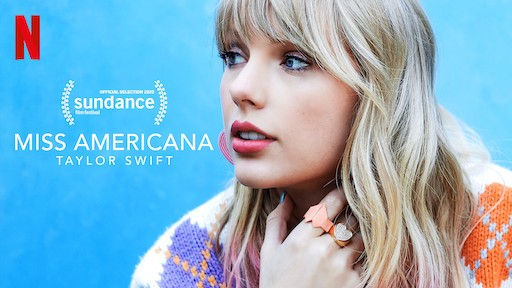Taylor Swift: Miss Americana
- Zem Luzon
- Oct 22, 2021
- 5 min read
Updated: Oct 23, 2021
Miss Americana (also known as Taylor Swift: Miss Americana) is a 2020 American documentary film directed by Lana Wilson, that follows American singer-songwriter Taylor Swift and her life over the course of several years of her career. It was released on Netflix and in select theaters on January 31, 2020. The film is titled after Swift's 2019 protest song, "Miss Americana & the Heartbreak Prince".

Miss Americana follows Swift during a transitional phase in her career, as she wraps up her 2018 Reputation Stadium Tour and began creating her 2019 album Lover, while covering several years of her life through a biographical compilation of interviews,
flashbacks, studio footage, home videos, cellphone videos, and concert recordings. It focuses on sensitive subjects that Swift often avoided in interviews, such as her past battle with body dysmorphia and eating disorder, her mother's cancer diagnosis, the toxic internet culture and media scrutiny she faces her sexual assault trial, and her decision to go public with her political views, including LGBTQ+ allyship.

The documentary takes us through Taylor’s life and her rise to fame. She shares how for the first part of her career, she was consumed with a hunger for approval from others. Her entire persona was built on the premise of being a “good” girl: sweet, agreeable, likeable, pretty, thin, reserved, perfect.
A NICE GIRL DOESN’T FORCE THEIR OPINIONS ON PEOPLE. A NICE GIRL SMILES AND WAVES AND SAYS ‘THANK YOU.’ A NICE GIRL DOESN’T MAKE PEOPLE FEEL UNCOMFORTABLE WITH HER VIEWS. I WAS SO OBSESSED WITH NOT GETTING IN TROUBLE, I’M JUST NOT GOING TO DO ANYTHING THAT ANYONE CAN SAY ANYTHING ABOUT.
In ACT, we would say that Taylor was caught in “self-as-content” mode. She viewed herself as equivalent to the content of her thoughts and the content of others’ opinions about her. She was fused to an idea about who and how she was and had to be. And for good reason. She was and is constantly bombarded with both positive and negative messages about herself from millions of people.

We all know what happened by now: West interrupted Swift's VMAs acceptance speech to sing the praises of Beyoncé. It's led to a "narrative" around Swift that she has specifically asked to "be excluded from," even though, at times, she has waded into it. But the memory of that night is still so strong and you can tell it affected her deeply.
"It was so echo-y in there," she says. "At the time I didn't know they were booing him doing that. I thought they were booing me. For someone who's built their whole belief system on getting people to clap for you, the whole crowd booing is a pretty formative experience. That was sort of a catalyst for a lot of psychological paths that I went down. And not all of them were beneficial. It was all fueled by not feeling like I belonged there. I'm only here because I work hard and I'm nice to people. That work ethic, like, thank God I had that work ethic. Like, I can't change what's going to happen to me, but I can control what I write."

“The reason that the backlash hurt so much was because that used to be all I had,” Swift says of the public turning on her in 2016. One of the most meaningful themes in Miss Americana is the crucial lesson of learning to discard the idea that approval is valuable. Taylor has always been meticulously criticized, arguably more so than her contemporaries. In one scene, we’re shown a supercut of said backlash, with on-camera personalities calling her annoying, too skinny, opportunistic, “going through guys like a train,” and it’s doubly angering that most of the criticism came from other women. After the controversy surrounding West's song "Famous," and the lyrics that called her a "bitch," followed by Kim Kardashian West's release of tapes that appeared to show Swift giving approval for the song, there was a massive backlash against Swift. And she felt it deeply. "When people decided I was wicked and evil and conniving and not a good person," she says, "that was the one that I couldn't really bounce back from because my whole life was centered around it. She remarks about how many people have to be tweeting they hate you for #TaylorSwiftIsOverParty to be the number one trend on Twitter worldwide.
"We're people who got into this life because we wanted people to like us, because we were intrinsically insecure," she says in an emotional conversation with her mom. "Because we liked the sound of people clapping because it made us forget about how much we feel like we're not good enough. And I've been doing this for 15 years and I'm tired. I'm just tired of the...it feels like it's more than music now. Most days I'm okay, but...it just gets loud sometimes."

Taylor Swift opens up about why she’s keeping her relationship with actor Joe Alwyn private in the Netflix documentary Miss Americana, which debuted on the streamer on Friday. The couple began dating in 2016, though their romance did not become public knowledge until they were spotted together in May 2017. Despite Swift penning a number of love songs about Alwyn on her 2017 album Reputation and 2019 album Lover, the two have kept their relationship private. In the documentary, Swift explains that their relationship began at a tumultuous time in her life. Following her reignited feud with Kanye West that led to public backlash, she purposely stayed out of the spotlight, saying she felt “alone,” “really bitter” and like “a wounded animal lashing out.”

In 2018, Swift inspired 65,000 Tennesseans to register to vote after she spoke out against Republican Tennessee senatorial candidate Marsha Blackburn. Since then, she’s been a loud and proud advocate for LGBTQ rights and has been open about her political views. The reason Swift wanted to make Miss Americana, share such personal details about her life in a way she never has before, was this: She found her voice and learned how to speak up. “A nice girl doesn’t force her opinion on other people,” she recalls being told toward the beginning of her career. “A nice girl doesn’t make people feel uncomfortable with her views.”
"Only the Young", the film's promotional single, was used in advertising campaigns for Democratic presidential candidate Joe Biden and vice presidential candidate Kamala Harris in the leadup to the 2020 U.S. presidential election. Representative Eric Swalwell revealed that Swift authorized the usage of the song for the campaign free-of-cost, marking the first time she has allowed her music to be used in a political advertisement.





YAASS